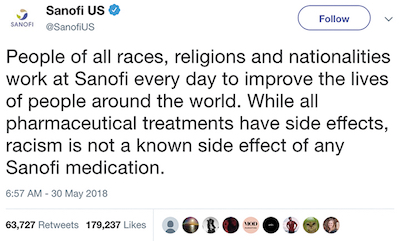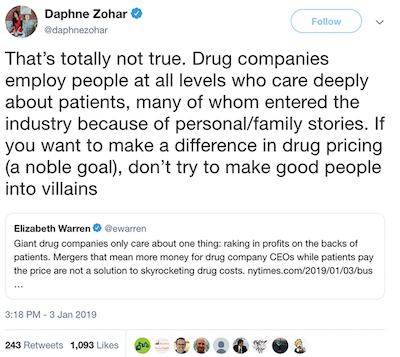 Eileen O’Brien Eileen O’Brien |
In recent years, my mantra was “social media is free like a puppy is free” to convey the resources required to do social media right. This was to cover the basics: content strategy, paid promotion, community management and measurement.
I’ve spent the past 10 years of my career focused on biopharma social media and I can assure you that, in 2019, the basics are no longer enough; we need to take advantage of the power of social media to have authentic conversations with our stakeholders. Social media is where audiences are spending a significant amount of time and offers a great medium to tell stories.
 |
| This article is featured in O'Dwyer's Oct. '19 Healthcare & Medical PR Magazine. |
In this year’s Gallup survey on industry reputation, pharmaceutical companies sank to the very bottom with only nine percent of Americans holding a “very positive” view of the industry, and 18 percent having a “somewhat positive” view. One way to help reverse that trend is to start using social media to humanize pharma and take control of the conversation.
True, authentic interaction on social media takes the following:
Preparation
Companies need systems in place to monitor the conversation and be able to nimbly respond. The best example of this was Sanofi’s response to Roseanne Barr’s assertion that its medication for insomnia was the reason she posted a racist tweet. There were two critical pieces to the success of Sanofi’s post: One, the speed at which the company responded, and second, the relatable tone. (Please note that I was not involved in this response.) Sanofi clearly had a process in place to get the right decision makers quickly aligned on a plan of action.
As demonstrated by this example, a detailed monitoring, engagement and issues protocol is essential to do social media well.
 |
Resources
Analytics, including the use of AI and machine learning, can help us automate pulling the data, but we still need to layer on human intelligence for social media engagement. It’s basic customer service to respond to questions via social media even when the question or comment is critical. However, it’s important to keep in mind that social media isn’t necessarily the place to be having nuanced conversations about a personal medical condition. Those conversations should be taken offline in many cases.
Guts
Taking a stand and having a perspective can be risky. However, as recent current events around gun control have shown, consumers increasingly want to know where companies stand on issues. Millennials, in particular, care about purpose-driven brands. Earlier this year, PureTech Health’s CEO Daphne Zohar responded to Senator Elizabeth Warren’s criticism of the pharma industry, reminding her that pharma companies are made up of people. Zohar received significant engagement from stakeholders on Twitter. The majority agreed with Zohar’s point and did not agree with Senator Warren’s generalization of the industry. Biopharma companies need to stand behind their products and practices.
 |
Expectation setting
Understand that there will be trolls—dedicated to disparaging others—and detractors. It’s important to evaluate the influence of the person commenting, and the number of followers doesn’t always give the full picture. We like to say to our clients, “Don’t feed the trolls or let them distract you but monitor them.” People looking for a constructive conversation should be engaged and know that they are being heard. We use data and experience to address these sometimes complex situations. While we aren’t going to please everyone, it’s important to get our perspective into the conversation.
Empowered employees
It’s easy for people to “hate” big pharma companies, but it’s harder to hate a person. Especially if that person is your neighbor who is on LinkedIn sharing the positive impact her pharma company is having in your local community. Biopharma CEOs have started to utilize social media, and our analytics show that they typically receive neutral to positive comments. It’s during times of business challenges that consumers and investors are quick to share their frustrations. While it’s great to see members of the C-site use social media, most, if they engage at all, are responding to media, policy and public figures and not to the average person.
However, it’s not only the C-suite who should be using social media to share the life-changing work of biopharma companies. Most companies have clearly defined social media policies that empower their employees to share on social media (excluding brand mentions). We have started to see employees in various roles up-level their social media channels in order to interact with stakeholders, including patient and physician influencers. Many are starting to use social media to build authentic relationships around a shared interest in healthcare and elevate the science.
In conclusion, relevant, authentic engagement can be done! We have been able to collaborate with forward-thinking biopharma clients and create processes using guardrails to do nearly real-time, unique engagement. While social media isn’t easy, it can positively impact a company’s business. However, it’s simply not enough to push out content on social media. We must be willing to engage in real conversation.
***
Eileen O’Brien is Managing Director of Social Media at W2O Group.


 Lo Isidro, senior director at Real Chemistry with more than a decade of strategic communications and PA experience, has joined Narrative Strategies.
Lo Isidro, senior director at Real Chemistry with more than a decade of strategic communications and PA experience, has joined Narrative Strategies. Nelson Fernandez, former North American chair of APCO Worldwide and managing director of Burson-Marsteller, has joined Volunteers in Medicine Berkshires as director of communications and PA.
Nelson Fernandez, former North American chair of APCO Worldwide and managing director of Burson-Marsteller, has joined Volunteers in Medicine Berkshires as director of communications and PA. Lilit Bargar, who was most recently an EVP in the healthcare practice at Weber Shandwick, comes on board at GCI Health as EVP, corporate practice lead.
Lilit Bargar, who was most recently an EVP in the healthcare practice at Weber Shandwick, comes on board at GCI Health as EVP, corporate practice lead.
 Five ways that successful thought leaders are made.
Five ways that successful thought leaders are made.


 Have a comment? Send it to
Have a comment? Send it to 
No comments have been submitted for this story yet.